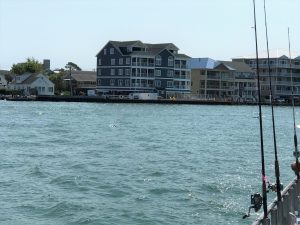
OCEAN CITY — New federal directives from the Centers for Disease Control (CDC) issued last week include stringent mask requirements on all modes of conveyance, including commercial fishing vessels and other vessels that carry groups of people.
Despite waning COVID-19 positivity numbers, the Biden Administration through the Centers for Disease Control (CDC) issued stringent mask requirements for all modes of conveyance, including commercial vessels, party boats, tour boats and, presumably, recreational sportfishing boats.
While the local commercial and recreational fishing industries are still sorting out exactly what it means for them, and their passengers and crews, the stricter mask requirement could have a significant impact on the industries as a new spring and summer season approaches.
The CDC order states “persons must wear masks over the mouth and nose when traveling on conveyances into and within the United States.” The order defines public maritime vessels, including ferries, and all forms of water-based transportation under the definitions spelled out.
The order requires passengers and crews to wear masks while on vessels from the time they board to the time they disembark including the duration of travel. The order also requires the Coast Guard to strictly enforce the order.
Congressman Andy Harris (R-Md.) wasted no time calling into question the section of the order regarding commercial watermen, party boats for hire, and tour boats, for example.
“While appropriate on some modes of transportation where social distancing with strangers cannot be maintained, this mandate is overly broad and leading to unseen frustration,” he said. “The Coast Guard has issued guidance that all commercial fishing vessel occupants will be required to wear masks, and that they will enforce this mandate.”
Harris said the order is overreaching for an activity that largely takes place outdoors, on the water and in the fresh air.
“Our watermen are completely outdoors, often numbering no more than three per vessel and have been working together without interruption since the beginning of this pandemic,” he said. “They are at extremely low-risk by the nature of their work.”
Harris said the Biden Administration and the CDC should be directing their attention on other high-spread risk areas than worrying about the open seas. He also said the Coast Guard has bigger fish to fry, so to speak, then worrying about enforcing a mask requirement out on the water in the fresh air.
“I urge the CDC to come forward and clarify this mandate, which includes sleeping while onboard, lacks legitimate scientific backing for small craft fishing vessels with minimal persons working onboard in an outdoor environment,” he said. “Rather than being Biden mask police for a low transmission industry, the Coast Guard should be spending their valuable time doing their core duties, especially drug enforcement.”
Locally, it is unclear what the new directive means for the resort’s vast sportfishing industry, along with the head boats and evening tour boats. Captain Franky Pettolina of the Last Call, said his sportfishing colleagues are sorting through the language in the CDC order, but it appears on the surface to include passengers and crews on recreational fishing boats.
“It’s going to be tough on people,” he said. “The charters are going to experience more seasickness because of this. No two ways about it. Last year, I had some folks that wore masks because they were concerned about COVID. They took them off as soon as they started feeling claustrophobic and tunnel vision because of them, which are common symptoms of seasickness.”

